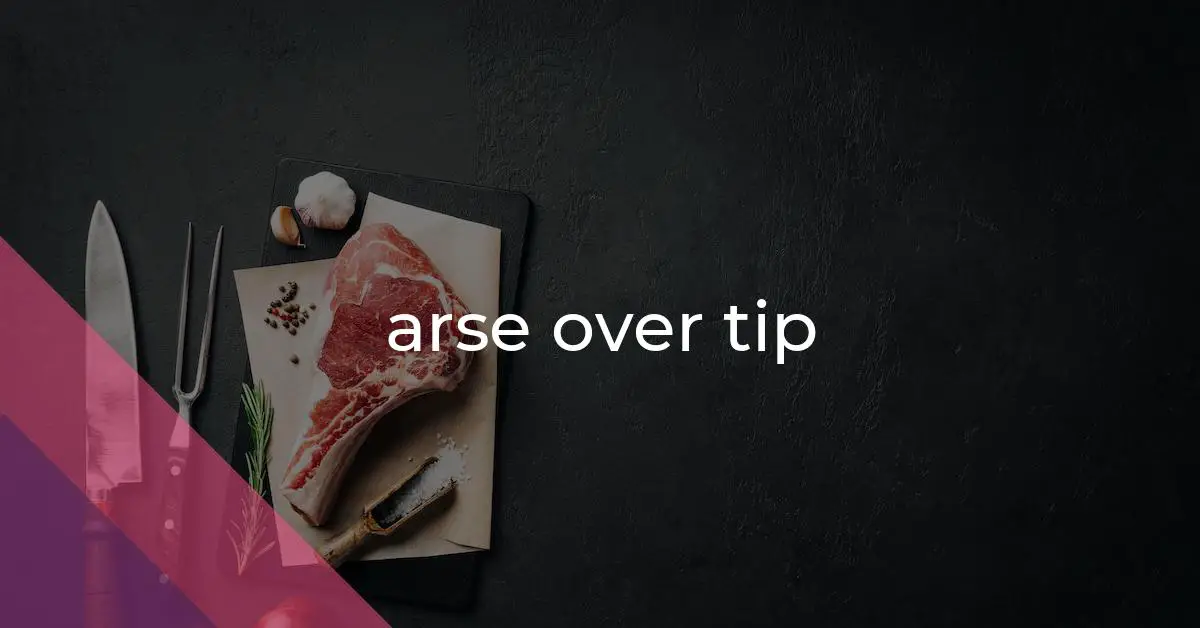arse over tip: Idiom Meaning and Origin
What does ‘arse over tip’ mean?
The idiom "arse over tip" means to fall or tumble head over heels in a clumsy or uncontrolled manner.

Idiom Explorer
The idiom "keel over" means to suddenly fall over, usually due to extreme tiredness, illness, or shock. It can also be used figuratively to describe a sudden collapse or failure of something.
The idiom "hit the roof" means to become very angry or furious about something.
The idiom "hand over head" refers to doing something quickly or without care, often in a hurried or reckless manner.
The idiom "go overboard" means to go to great or excessive lengths, often beyond what is necessary or reasonable. It implies an extreme or exaggerated action or behavior, often resulting from enthusiasm or excitement.
The idiom "go over" means to review or examine something thoroughly to ensure understanding or accuracy.
The idiom "go off half-cocked" means to act without proper preparation or forethought, often resulting in a blunder or failure.
The idiom "fork over" means to reluctantly give or hand over something, typically money or possessions, often under pressure or unwillingly.
The idiom "fall over" means to lose one's balance and collapse, often due to tripping, stumbling, or fainting.
The idiom "fall on one's face" means to fail or make a mistake in a very obvious or embarrassing way.
The idiom "fall foul" means to come into conflict or disagreement with someone or something, often resulting in negative consequences.
Origins Unveiled
The idiom "arse over tip" is related to several other idiomatic expressions that convey a similar meaning or concept. Although these phrases may differ slightly in wording or regional usage, they all share the common theme of something or someone being in a state of imbalance or chaos.
One related idiom is "arse over tit," which is another colloquial expression primarily used in British English. Like "arse over tip," this phrase describes a person or object being turned upside down or in a topsy-turvy state. It conveys a sense of disorder or disarray.
Another related idiom is "fall over," which is a more straightforward expression used to describe someone or something losing balance and tumbling to the ground. While it does not specifically mention the rear end, it shares the same idea of physical imbalance or falling.
A similar phrase is "base over apex," which is also used to convey the notion of something or someone being turned upside down. This expression is less common and more regional, primarily used in certain parts of the UK. It offers an alternative way of describing a state of disarray or imbalance.
Additionally, the idiom "keel over" is related to "arse over tip" in the sense of describing a sudden and unexpected collapse or fall. While it does not specifically mention the rear end, it communicates the idea of a person or an object falling in a chaotic manner.
Lastly, the idiom "die on one's arse" is another expression related to "arse over tip." It is often used to describe a failure or a lack of success in a specific endeavor. While it does not involve physical imbalance or falling, it shares the common element of the rear end, adding a humorous and colloquial touch to the phrase.
These idiomatic expressions, including "arse over tip," provide colorful and imaginative ways to describe various states of imbalance, disarray, or falling. They add depth and nuance to the English language, allowing individuals to convey specific meanings and emotions in everyday conversations.
Example usage
Examples of how the idiom "arse over tip" can be used in a sentence:
- He tripped and went arse over tip down the stairs.
- After losing his balance on the skateboard, he fell arse over tip and scraped his knee.
- When the child slipped on the wet floor, he went arse over tip and landed on his backside.
More "Accidents" idioms
We missed the mark - nothing found.



